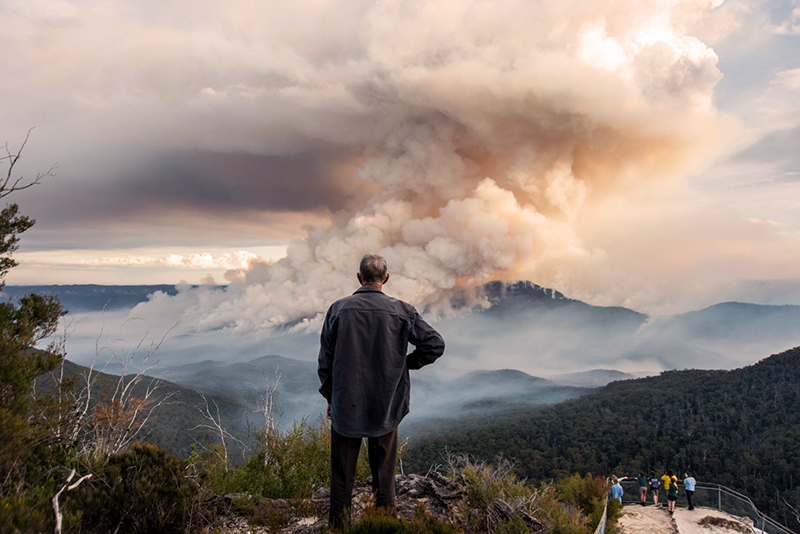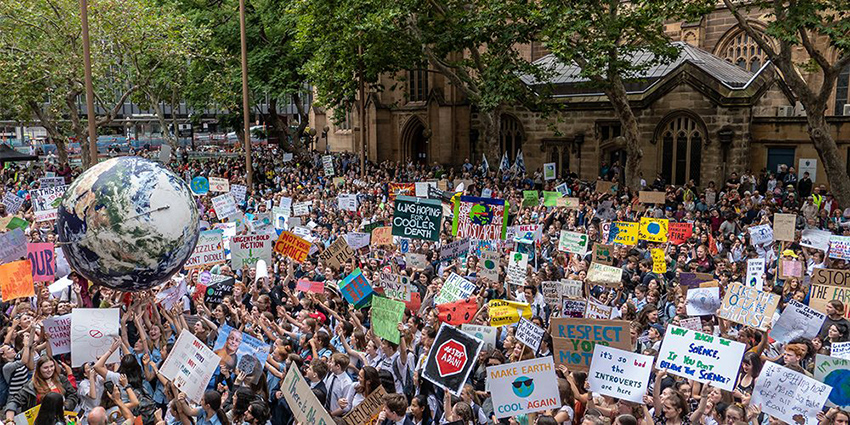Honesty and courage in a world on fire
Leadership and wisdom in the climate crisis

Would you have believed me if I’d told you, just 12 months ago about the speed with which the Student Climate Strike and Extinction Rebellion movements would grow; that Greta Thunberg would be Time’s 2019 Person of the Year and ‘Climate Emergency’ the Oxford Dictionary Word of the Year? Or that an Australian Prime Minister would respond with little more than ‘thoughts and prayers’ to the vast fires engulfing our country?
The case for emergency speed emissions reduction and climate justice is now crystal clear. As Lenton et al argue in their recent Nature article, ‘Climate tipping points – Too risky to bet against, ‘the evidence from tipping points alone suggests that we are in a state of planetary emergency….The stability and resilience of our planet is in peril. International action — not just words — must reflect this.’
Courageous leadership and decisive collective action to accelerate the transition to a just and resilient zero-carbon economy clearly remain our first and most urgent challenge.
Awareness that even the most rapid and decisive emissions reduction action will still be insufficient to prevent severe and irreversible social and ecological impacts leads however to a second tough and urgent question: What sources of emotional resilience, wisdom and learning can enable us to face a harsh climate future with fierce honesty, radical hope and defiant courage?
The fellowship and solidarity of collective action is in fact, as historian Howard Zinn points out, generally the best place to start a tough journey in dark times. ‘Human history is a history not only of cruelty, but also of compassion, sacrifice, courage, kindness. If we remember those times and places — and there are so many — where people have behaved magnificently, this gives us the energy to act, and at least the possibility of sending this spinning top of a world in a different direction.’
The hardships of the journey may also seem less arduous, Rachel Carson reminds us, if we take time out for healing and renewal among the mountains and forests; rivers and oceans of the natural world. ‘Those who contemplate the beauty of the earth find reserves of strength that will endure as long as life lasts. There is something infinitely healing in the repeated refrains of nature — the assurance that dawn comes after night, and spring after winter.’
My friends and colleagues from Indigenous, spiritual and faith-based traditions all in different ways highlight the sustaining power of kindness and compassion; kinship and friendship; thankfulness and care. Tyson Yunkaporta, author of Sand Talk, oneof my favouritebooks of 2019, also notes the increasing relevance of Einstein’s sensible advice: we can't solve problems with the same kind of thinking that we used to create them.
'We can learn how to live in proper relation with creation by aligning our cultures, economies and ways of life with our local land-bases. We can learn from the coping strategies and resilience of refugees and work with them to design ways of living well in periods of displacement. We can learn from other displaced communities who are struggling to survive at the margins, through dialogue and caring for each other.'

And we can also clearly learn a great deal from the millions of young people who created the most memorable and inspiring images of 2019, the global School Strike for Climate. Who could forget for example the pithy eloquence of messages like ‘I’ve seen better Cabinets at Ikea’ or ‘We’ll be less activist, if you’ll be less shit’?
‘Young people’ as Rebecca Solnit correctly points out ‘are the leadership in this moment, the people who are thinking about 2100, the people who are ready to change everything, the people who understand the gravity and scale of the catastrophe… Juvenility and maturity are no longer categories attached to how long you’ve been on Earth, but how far you see and how much you care…’
All of which leads to the following pressing question about our intentions for the coming year. What actions will each of us take to shift the climate change tipping points, shocks and surprises of 2020 and beyond in the best possible direction?
John Wiseman is a Professorial Research Fellow at the Melbourne Sustainable Society Institute. His current research focusses on actions required to drive a just and rapid transition to a zero-carbon economy and on the wisdom and learning which can help us face a harsh climate future with honesty and courage.